November 22, 1926.
Dear Miss Addams:
I was so glad to get your letter of November 18th this morning and I am sending you in this letter a copy of my retraction sent to the Legion in Sioux City. I do not know in how much detail you want my conversation with these Legion men but I shall give it very fully in case you want to know exactly what steps I took.
On the morning of November [blank] arrangements were made by the women of the small branch in Sioux City for a meeting with Commander S. G. Eaton of the Monahan Post of Sioux City and Jesse Marshall, a member of the same post, who wrote the article against us in the April Post News. We met at the office of Mr. Marshall and the women present were: Mrs. Walter Britton, Mrs. H. H. Holmes, Mrs. Charles A. Hoyt, Mrs. T. B. Hutton, Miss [Adaline] Lewis, and myself.
I began by telling Mr. Eaton that I felt it was very stupid that two organizations such as the Women's International League and the Legion, which were both so interested in international peace, should have any friction caused by misunderstanding. I said that I had a very friendly feeling toward Legion men as I had three brothers in the service during the war, two of whom were members of the American Legion, one belonging to the Iowa Branch; that I felt that I wanted them to know in the beginning that I had nothing but a very kindly feeling toward ex-soldiers and that I felt I expressed the feeling of our whole organization; that after all one of the fundamental reasons for our existence was to save these men or other boys growing up, from the same experience. [page 2]
On the outside of the Monahan Post News is a little explanation written by S. G. Eaton, the Commander, on the reasons for the attack on us. In blackened type are these words, "We have earned the right to be heard." I looked down at the Monahan Post News that I held in my hand and read that sentence and then looked up and asked Mr. Eaton where he had served during the war. He became very red and told me that he had never served outside of a training camp in the United States. I then told him that I felt that that was what ↑we↓ were finding every place -- that it was the men who had served in Iowa or Texas or such other western [fronts] who were launching these attacks on us and who were ridiculous enough to write such things as "We have earned the right to be heard." Mr. Eaton said that he felt that he deserved just such ridicule as I suggested.
I then took the article and went over it sentence by sentence. I am enclosing a copy of it for you so that you may see it. I began with the word "notorious" and asked Mr. Marshall, who wrote the article, what he meant by this. He said it meant an organization which had notoriety, and it was necessary for me to push him to say "unpleasant notoriety."
We went down through the first few sentences as far as the words "vicious" and "unpatriotic" and I asked him to define both of these words. We spent, I suppose, three-quarters of an hour on the meanings of the words, "notorious," "vicious" and "unpatriotic," and Mr. Marshall and Mr. Eaton finally agreed that they would consider such words insulting if used with regard to the Legion and acknowledged that they were too strong and apologized for having used them.
We came to the next sentence, "It is directly affiliated with the Communist Government of Russia ..." and Mr. Eaton said that that was too strong an expression. Mr. Marshall defended it on this ground -- that our international Secretary is Madeleine Doty, that her husband is Roger Baldwin and that on one of the boards on which Roger Baldwin serves is William Z. Foster, who is a Communist; and that, therefore, we were directly affiliated with the Government of Russia. I tried to show him that in that way the W.I.L. was then directly affiliated with the American Legion by proving relationships, etc., etc. Finally they agreed that the sentence should never have been written and was a misstatement.
The next part -- "and draws much of its financial support from the Garland Fund ..." we took up next. I asked them what proportion they considered "much" of the budget of an organization. Both men hedged for a little while on this, but they finally agreed that "much" must mean more than half of an organization's budget. I then told them that our expenditures for last year were approximately $48,000, of which approximately $1400 came from the American Fund for Public Service, and asked them what they had to say about that. They then [page 3] both agreed that this was a misstatement and was written without facts. The next part of the sentence that implies that the W.I.L. approves or condones "love cult colonies" they laughed about, but finally agreed that the implication was insulting and had no foundation. We had to discuss tainted money for a little while and while they were hesitating I asked them if they were to go into the moral standards of all the contributors to the American Legion they did not believe that it might be possible for me to find a contributor to the Legion whose moral qualifications were no better than the alleged ones of Charles Garland. They agreed and said it was unfair and unjust to have printed such an implication.
The next statement about "the abolition of all forms of military training in the United States," we discussed and I asked them what they meant by "all forms" and they told me they meant compulsory training and other military training in schools. I told them that this statement was correct -- that we did disapprove of military training and gave our reasons for it.
The next statement, "but would continue the present system of military training in the Government of Russia" -- neither had an answer to, neither was able to prove, and both acknowledged that it was a direct misstatement of facts; and the next part of the sentence, "which country maintains the largest standing army on earth," is, of course, also incorrect if taken by their standards of proportion to territory and wealth, size of country, etc. ↑while they did in their resolutions re: the U.S. Army.↓ I took the population and miles of frontier for Russia and then for France and then the comparison of men under arms and made them acknowledge that even in this matter of fact regarding standing armies they did not know what they were talking about. They seemed to be very much surprised that I knew and had to acknowledge they had just written that hastily.
With regard to the immediate recognition of the present government of Russia I explained that in this we had fairly good company as practically all civilized countries in the world had recognized Russia, that recognition of the de facto government of Russia was traditional American policy and that were supported by Senator Borah. On this, of course, there was definite disagreement and Mr. Marshall said that he felt we had no right to recognize a government "whose hands were so covered with blood;" whereupon all the women in the room laughed and even Mr. Eaton had to.
The sentence, "It also urges incessant agitation for the release of all persons confined in prisons and [penitentiaries] for crime committed during the war," they said was a little strong and that no one reading it would have known what they meant ↑[taken] it literally↓. Mr. Marshall is a lawyer and I said that I had had no legal training, but that I wondered if in a court of law his statement, that no one would accept this statement as it was written, would be held. He agreed [page 4] it would not. They were much surprised to find that conscientious objectors had all been released from prison and felt that this was still part of our active program.
Of course, the old idea that we were author of the Slacker's Oath they seemed to be sure of and were quite surprised that the Woman's Peace Union and the W.I.L. were not the same thing. They insisted that because certain of our members belonged to other organizations which did have an oath ↑[then it?]↓ made the W.I.L. responsible for it. We discussed this for some time and I asked them then if they would feel that because certain American Legion men got drunk at a Legion convention that it was fair to condemn the whole Legion for it, or to consider the approval of drunkenness a part of Legion policy. They agreed that they did not; that that would be grossly unfair and finally acknowledged that an organization as such can only be judged by its constitution, its program and its resolutions, no matter what the acts of individual members.
We then had a long discussion on the W.I.L. Program, which I explained in some detail. Mr. Marshall is a Democrat and a strong advocate of the League of Nations, and on our program for the World Court and League of Nations we seemed to agree. He was quite surprised that we were at all interested in international machinery.
When I finished I asked if they did not feel that they would like to offer to retract these misstatements and Mr. Eaton said they certainly would; that they did not wish to be unfair or misrepresent facts and they very much regretted having done so; that he would see to it that they retracted. I then asked him how he would do it and he said that he would write the article and send it to me for approval before printing. I then saw complications and said that what we wanted was a retraction and that I feared that this might take some time unless we did it while I was there. Mr. Eaton then suggested I write the article and promised to he would publish anything that I wrote. This was agreed to and I then asked him how I would be sure that he would put it in in the same spirit in which we were ending our conference; that the thing that I objected to was unfair opposition in which implications which were unpleasant, etc. were used; and he said, as nearly as I can remember his words, "Well, with regard to this retraction I shall print in the Monahan Post News whatever retraction of these misstatements which you send and as to my printing them fairly and justly without bitter editorial comment, well, you will have to depend upon my honor as a gentleman."
This was the end of our interview and in the afternoon, as you will recall, I saw the ladies of the D.A.R. In the meantime I had seen the editors of both newspapers and the day after I left there was a very decent write-up of my reasons for coming, etc.
I think our W.I.L. members there were so excited about the [page 5] retraction that they went around bragging about it, which caused an executive meeting of the Legion; and the Executive Committee first had resolutions against us and then the District Legion had.
Jesse Marshall is the editor of the "Legionnaire," the official Iowa paper, and I should say that he is was one of the worst of that group. Marshall, who wrote the editorial, is a very surly person, and I think was so angered by Commander Eaton's attitude when Eaton said over and over again, "Of course, that never should have been written," that I think he will do anything now to continue to hurt us.
The new Senator, Senator Stewart from Sioux City, is a member of the Legion, but as I understand, is not very friendly to the local post. According to a letter from our Secretary, Mrs. Lewis in Sioux City, very few of the Legion men were present when the resolutions were drawn up against us. I have sent the retraction, which I am enclosing and the letter to Commander Eaton and now await results. I have sent copies also to our branch out there, asking them to wire me if they learn that the Legion will not print my retraction as promised. If this is not done I plan to send the whole correspondence and a statement to Harvey Ingham of the Des Moines, Iowa Register, who is a strong pacifist and who I think will show up the whole matter. It is now a state affair and a Des Moines paper would give it much more publicity than just a small Sioux City one. Do you approve of this?
Faithfully yours,


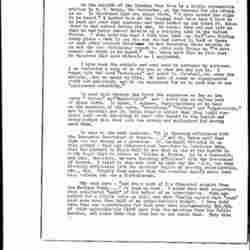
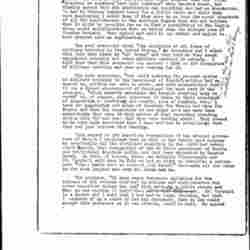
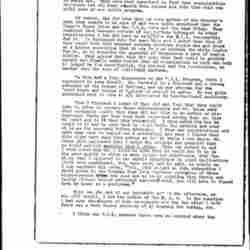
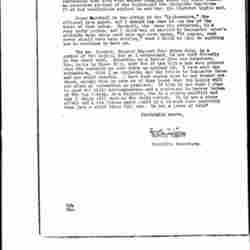
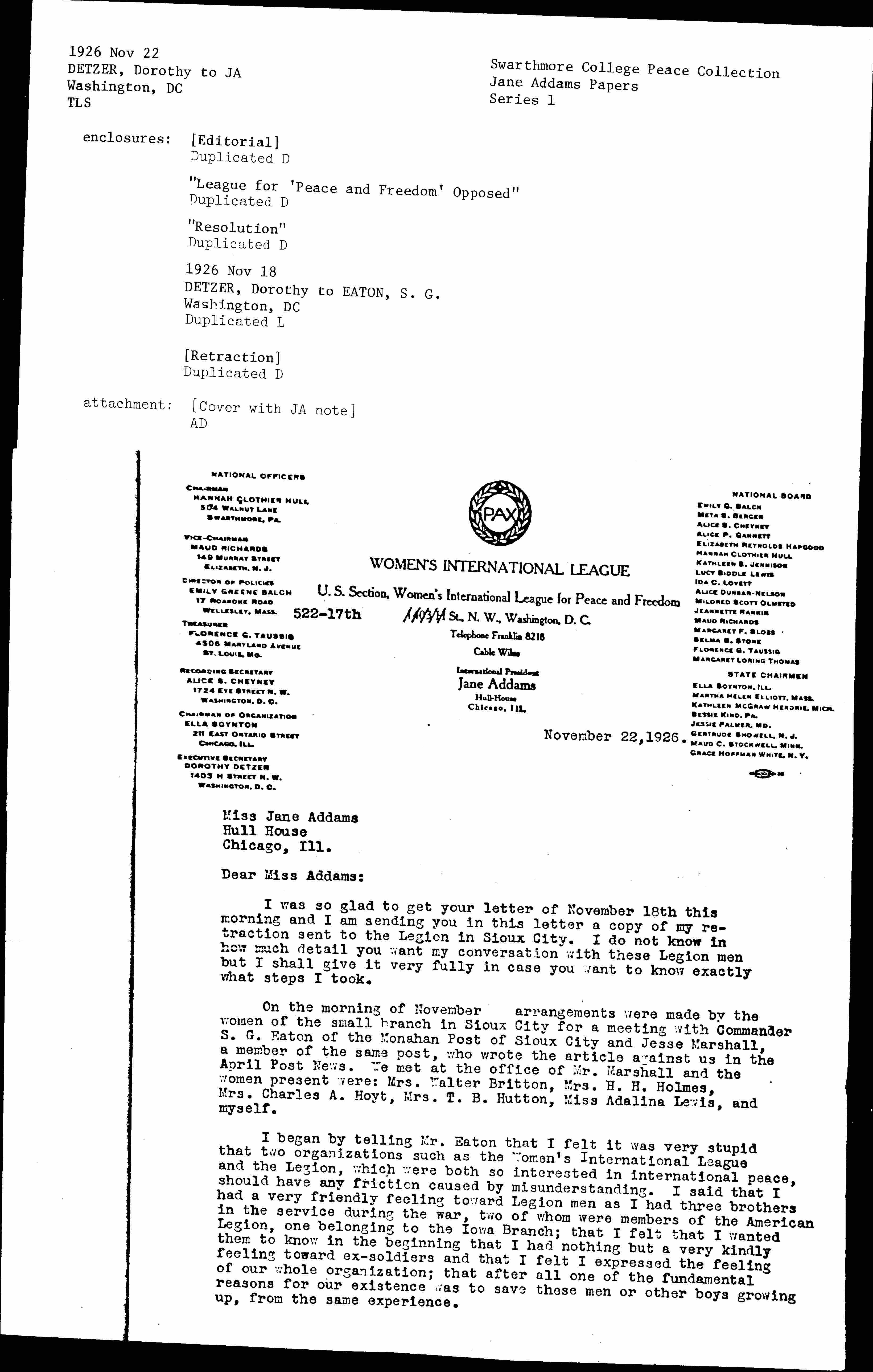





















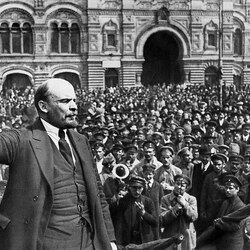
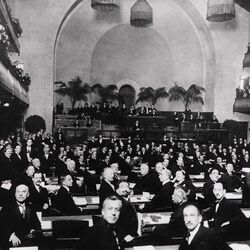

Comments